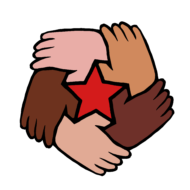When you talk to people about socialism, one of the first arguments doubters trot out is that communism could never work, because people are too lazy and greedy to behave altruistically. According to the doubters, people won’t bother to work if they already have their basic needs met.
The human nature argument is metaphysical in nature. It takes the social traits of greed and slovenliness that develop due to capitalism, and assigns them the unbreakable power of eternal human nature. But as Andrew Collier said:
“To look at people in capitalist society and conclude that human nature is egoism, is like looking at people in a factory where pollution is destroying their lungs and saying that it is human nature to cough.”
The character traits and beliefs that are prevalent during any era in a society stem largely from its material conditions. In our capitalist societies, where collectivist working class movements are often demonized or given no air time, we’re taught instead to look out for our own individual interests as we struggle to survive. We have to “stand on our own two feet,” “be a good provider,” and “only breed if we can afford to feed.”
Every job application is a competition against our fellow workers for the income we need to survive. We’re not working together to create the products and services necessary for our survival, we’re individuals in rugged competition over precious money. Every hard to pay bill or ad for a shiny new product spurs us to chase more money. We come to lust over the wealth that would secure our material needs and allow us to live in comfort, with high social status.
Meanwhile, it suits those who can afford to pay opinion makers, to spread the idea that wealth is achieved through hard work and merit, and that it’s something to be admired. Far from it being a mark of shame to live in luxury while others starve, we’re taught that it’s admirable and worth emulating. That’s what it means to be a winner.
All these ideological beliefs stem from the economic relations of our current society. They can only come about when a small portion of the population hoard wealth for themselves and keep the rest in a precarious position under wage slavery.
The idea that “greed is good” could never have become widespread under conditions of primitive communism. The ability to safely let members of your community starve is a privilege only available in societies with abundant resources. In hunter gatherer societies, the good of the community came first, for everyone’s benefit. The person starving today might be the person who could help you survive in the future.
Under capitalism, the wealth created collectively by the sweat of the workers is shared unevenly, and people adopt the ideas that help them survive and prosper in this hellscape – ideas that are fed to them as ways to work within the system. Rise and grind. Got to pay yourself first. Vote harder.
With the abolition of private ownership of the Means of Production, the mindset of individualistic greed will soon crumble. When nobody can obtain wealth by exploiting other people’s labor, there’ll be nobody pumping out endless content that glorifies individual greed.
With everyone’s needs for food, housing, and other necessaries are guaranteed by society, new beliefs will arise – ones that match that material reality.
The fact that goods and services are no longer produced to be exchanged for money will change people’s relationship to work. We can already see what that looks like on a smaller scale.
Does a family operate as a market economy? Does Spouse A pay Spouse B $40 for dropping the kids off at school, and they pay Spouse A $40 for cooking dinner? A household divides up the work that needs to be done and does so without recourse to markets. Its members negotiate the terms either explicitly or implicitly and then do what’s necessary.
We see the same thing happen when accidents or natural disasters occur. People drop what they’re doing and do what’s necessary for the good of the community, even though there’s nothing stopping them from selfishly putting their own needs first. If this is how people operate in a capitalist society that trains them to be greedy, imagine how they’ll behave in a society that trains them to be communally minded from birth.
Despite our current economic and social system, the world is already full of examples of people doing labour without any expectation of financial or social reward.
Much of the software that runs your phone and its apps are built on open source code, which thousands of volunteers helped to create in their free time. Very few of those people receive any recognition; they just wanted to create something worthwhile.
Then there are people who spend their free time working for charity. There are political activists who spend hundreds, if not thousands of hours campaigning for causes that don’t directly affect them.
The truth is that most people find fulfillment in doing constructive activities to better the world. What they don’t find fulfiling is doing extra labor to provide capitalists with profits, or in doing meaningless jobs that are entirely unnecessary to the functioning of a healthy society.
With the abolition of wage labour, in favour of production and distribution of goods by free association, cultural ideas about the purpose of work will likely change, away from work being an evil necessary for individual survival, to being a public duty.
It also seems strange to imagine that the social pressure to pull your weight in society would disappear just because private ownership of business is abolished.
From time immemorial, people have organized themselves to complete the necessary tasks of their day. Why would that stop under Communism?





